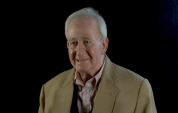5:43 | Shortly after some much appreciated R&R, Julius Rainwater's Signal Corp unit was told to pack up and get ready to leave. They were on the dock when the order was reversed. Three days later, a very special bomb was dropped on Hiroshima.
Keywords : Julius Rainwater Rest and Relaxation (R&R) Anguar Saipan radio Victory in Europe Day (VE Day) Japan atomic bomb Yokohama civilian kimono

He'd already been studying radio communications, so the Army sent Julius Rainwater to the Signal Corps. He learned Morse Code and became adept at copying coded messages. Most of the men were from the northeast, but the Georgia boy made fast friends while training.
The destination was unknown when Juius Rainwater boarded the liberty ship and headed out into the Pacific. The first stop was Hawaii, where he had a chance meeting on the street with his brother, who was also in the service. When he shipped out again, he asked the captain if he could start a newspaper on board the ship. Good idea.
En route through the Pacific on a liberty ship, Julius Rainwater heard Tokyo Rose threaten his convoy on her broadcast. It was an empty threat and he made it to Anguar, an island near Peleliu, where he set up a radio communications station. There were still Japanese in the hills, so they had guard duty and, when it was his turn, he was sure he saw something creeping up in the darkness.
Julius Rainwater had a chance to meet his brother after the war ended with the Japanese surrender. It was in Inchon that the two crossed paths. Julius would go on to Okinawa where he waited for the points system to allow him to go home. He made very good use of his time while he was waiting. Finally, the day came.
What went on in the decrypting room and why couldn't Japan break the code? It was the Navajo code talkers, says Julius Rainwater, a radio operator. He was not a big drinker, so when the officers brought out the booze on VE Day, it got a little out of hand.